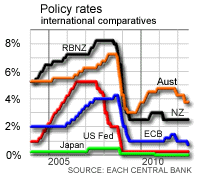 The Reserve Bank of Australia left its official interest rate unchanged at 3.25% today, surprising markets which had expected a cut. (Updated to include RBA statement and currency reactions).
Economists had expected a 50 basis point cut to 2.75%. The Reserve Bank of New Zealand is widely expected to cut its Official Cash Rate by 100 basis points to 2.5% next Thursday, which has helped drive the New Zealand dollar down against the Australian dollar on the prospect of a lower New Zealand OCR than the Australian rate for the first time in six years.
Both the Australian and New Zealand dollars rose against the US dollar on the news, with the Australian dollar rising slightly on the Kiwi.
Here is the statement by RBA Governor Glenn Stevens accompanying the announcement:
The Reserve Bank of Australia left its official interest rate unchanged at 3.25% today, surprising markets which had expected a cut. (Updated to include RBA statement and currency reactions).
Economists had expected a 50 basis point cut to 2.75%. The Reserve Bank of New Zealand is widely expected to cut its Official Cash Rate by 100 basis points to 2.5% next Thursday, which has helped drive the New Zealand dollar down against the Australian dollar on the prospect of a lower New Zealand OCR than the Australian rate for the first time in six years.
Both the Australian and New Zealand dollars rose against the US dollar on the news, with the Australian dollar rising slightly on the Kiwi.
Here is the statement by RBA Governor Glenn Stevens accompanying the announcement:
At its meeting today, the Board decided to leave the cash rate unchanged at 3.25 per cent. Recent data confirm that the world economy has remained very weak following the sharp decline in demand that occurred late last year. The major industrial economies reported large contractions in output in the December quarter, as did a number of emerging market economies across Asia and eastern Europe. Many countries are likely to be experiencing further falls in output in the current quarter. Conditions in global credit markets have improved since November, but sentiment remains fragile. Share prices have weakened and banking systems in several major countries are still under pressure, as authorities work towards a resolution of the balance-sheet problems. Significant macroeconomic policy stimulus is being put in place around the world, but it is too soon to see the effects of those measures. In Australia, demand has not weakened as much as in other countries and, on the basis of currently available information, the Australian economy has not experienced the sort of large contraction seen elsewhere. The Australian financial system remains strong and the monetary policy transmission process is working to deliver large reductions in interest rates to end borrowers. Nonetheless, economic conditions are clearly weak, and given the speed and scale of the global economic deterioration and its effect on confidence, weak conditions are likely to continue in the near term. Inflation is likely to decline over time. In response to that outlook, there has already been a major change in both monetary and fiscal policy. Market and mortgage rates are at very low levels by historical standards and business loan rates are below recent averages, reducing debt-servicing burdens considerably. Together with the substantial fiscal initiatives, the cumulative decline in interest rates will provide significant support to domestic demand over the period ahead. On this basis, notwithstanding evident economic weakness at present, the Board judged that the stance of monetary policy was appropriate for the moment. The Board will consider the position again at its next meeting.

We welcome your comments below. If you are not already registered, please register to comment
Remember we welcome robust, respectful and insightful debate. We don't welcome abusive or defamatory comments and will de-register those repeatedly making such comments. Our current comment policy is here.